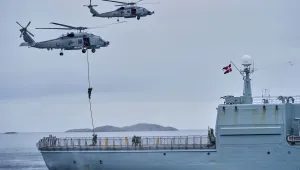
- The Russian Rules of Navigation in the Northern Sea Route do not apply to warships.
- Most of the Russian claims in the NSR cannot serve as valid targets for a US FONOP.
- The Russian claim on the NSR's straits seems to be the only valid target for a FONOP.
- Russian decision to introduce a notification-based scheme for warships in the NSR could trigger a FONOP.
- FONOP in the eastern straits of the NSR would imply significant operational risks.
Abstract
Against the backdrop of growing tensions in the Arctic there are increasing discussions in the US on whether a Freedom of Navigation Operation (FONOP) is needed in the Northern Sea Route (NSR) to assert the state's disagreement with the Russian maritime claims in the Arctic. This paper focuses on the Russian claims with regard to the NSR that could be deemed valid targets for a FONOP. The analysis shows that the US Navy would have only few options for a potential operational assertion. The most viable of them is to transit through certain straits in the eastern part of the NSR. Given the lack of surface ice strengthened warships in the US Navy, a FONOP in the eastern areas of the NSR would imply significant operational risks related to harsh ice conditions even in the summer season. All that, coupled with other factors, gives reason to suggest that for the time being the US will set aside plans for a FONOP in the Russian Arctic waters.
Todorov, Andrey. “Dire Straits of the Russian Arctic: Options and Challenges for a Potential US FONOP in the Northern Sea Route.” Marine Policy, March 2022
The full text of this publication is available via Marine Policy.





